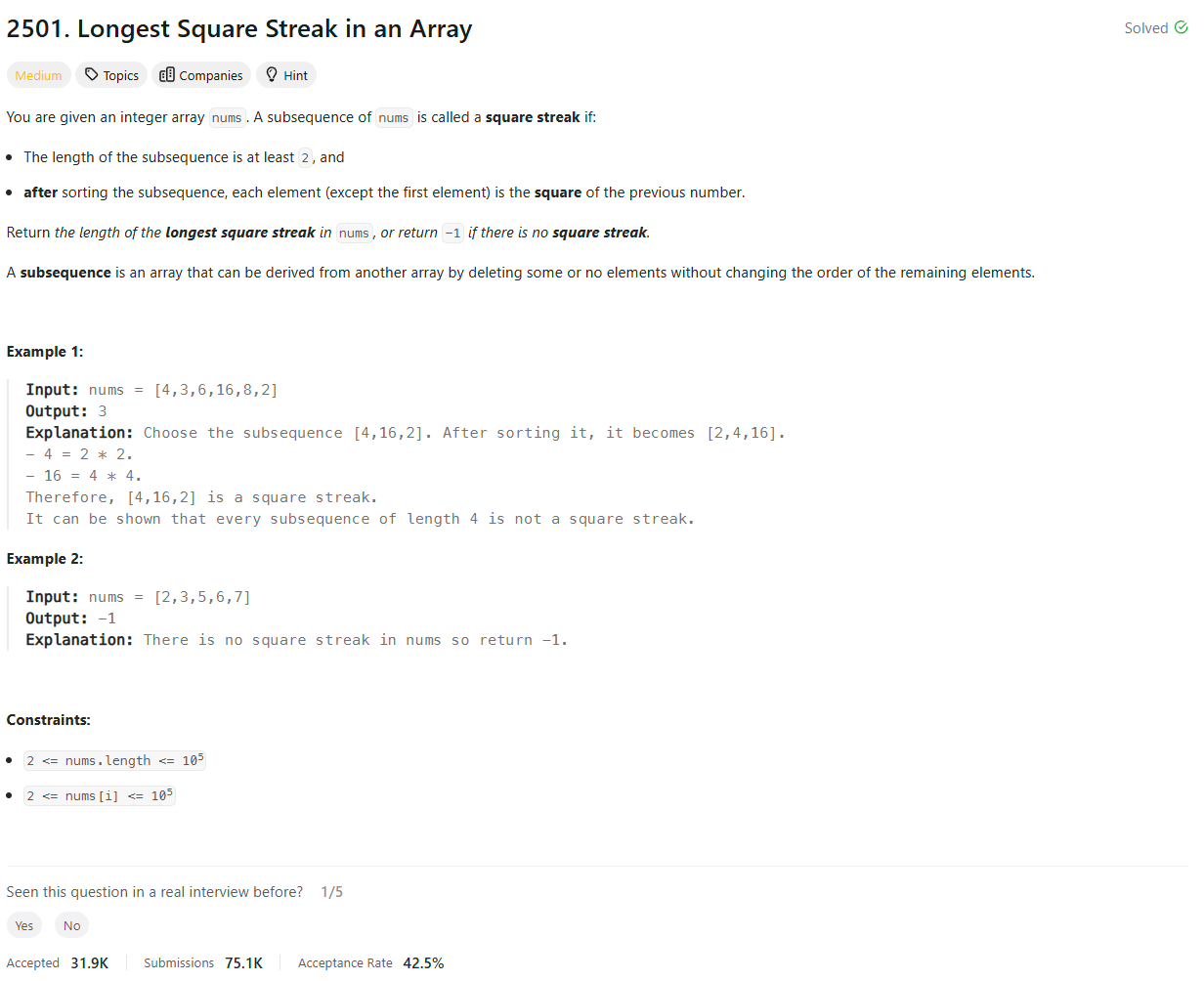Problem of The Day: Longest Square Streak in an Array
Problem Statement

Intuition
The primary goal is to find the longest sequence where each element is a perfect square of the previous one. The intuition is to leverage the unique squares within the input list nums by using a set, allowing us to quickly check for the presence of squares in constant time.
Approach
- Convert the list
numsinto a set,unique_nums, to allow for constant-time checks of whether the square of a number exists innums. - Initialize
resto-1, which will store the maximum sequence length found. - Loop through each number in
nums, treating each as a potential start of a square-streak sequence.- For each number, initialize
lengthto1and setcurrto the current number. - While the square of
currexists inunique_nums, updatecurrto its square, incrementinglengthto track the streak’s length.
- For each number, initialize
- Update
reswith the maximum sequence length found that has at least two numbers (length >= 2). - Return
resas the result.
Complexity
- Time Complexity: \(O(n \log \text{max}(nums))\), where (n) is the length of
nums. For each number, we may need to check multiple squares up to the maximum possible value innums. - Space Complexity: \(O(n)\), required to store the unique elements in the set
unique_nums.
Code
class Solution:
def longestSquareStreak(self, nums: List[int]) -> int:
unique_nums = set(nums)
res = -1
for num in nums:
length = 1
curr = num
while curr ** 2 in unique_nums:
curr = curr ** 2
length += 1
if length >= 2:
res = max(res, length)
return res
Editorial
Approach 1: Binary Search
class Solution:
def longestSquareStreak(self, nums: List[int]) -> int:
# Sort the array in ascending order
nums.sort()
# Set to keep track of numbers we've already processed
processed_numbers = set()
longest_streak = 0
# Iterate through each number in the sorted array
for current in nums:
# Skip if we've already processed this number
if current in processed_numbers:
continue
streak = current
streak_length = 1
# Continue the streak as long as we can find the square of the current number
while streak * streak <= 10**5:
if self._binary_search(nums, streak * streak):
streak *= streak
processed_numbers.add(streak)
streak_length += 1
else:
break
# Update the longest streak if necessary
longest_streak = max(longest_streak, streak_length)
# Return -1 if no valid streak found, otherwise return the longest streak
return longest_streak if longest_streak >= 2 else -1
# Binary search helper function to efficiently find a value in the sorted array
def _binary_search(self, nums: List[int], target: int) -> bool:
left, right = 0, len(nums) - 1
while left <= right:
mid = (left + right) // 2
if nums[mid] == target:
return True
elif nums[mid] < target:
left = mid + 1
else:
right = mid - 1
return False
- time: O(nlogn)
- space: O(n)
Approach 2: Set
class Solution:
def longestSquareStreak(self, nums: List[int]) -> int:
longest_streak = 0
# Create a set to store all unique numbers from the input array
unique_numbers = set(nums)
# Iterate through each number in the input array
for start_number in nums:
current_streak = 0
current = start_number
# Continue the streak as long as we can find the next square in the set
while current in unique_numbers:
current_streak += 1
# Break if the next square would be larger than 10^5 (problem constraint)
if current * current > 10**5:
break
current *= current
# Update the longest streak if necessary
longest_streak = max(longest_streak, current_streak)
# Return -1 if no valid streak found, otherwise return the longest streak
return longest_streak if longest_streak >= 2 else -1
- time: O(n)
- space: O(n)
Approach 3: Map
class Solution:
def longestSquareStreak(self, nums: List[int]) -> int:
# Dictionary to store the length of square streak for each number
streak_lengths = {}
nums.sort()
for number in nums:
root = int(number**0.5)
# Check if the number is a perfect square and its square root is in the dictionary
if root * root == number and root in streak_lengths:
# Extend the streak from its square root
streak_lengths[number] = streak_lengths[root] + 1
else:
# Start a new streak
streak_lengths[number] = 1
# Find the maximum streak length
longest_streak = max(streak_lengths.values(), default=0)
# Return -1 if no valid streak found, otherwise return the longest streak
return longest_streak if longest_streak > 1 else -1
- time: O(nlogn)
- space: O(n)